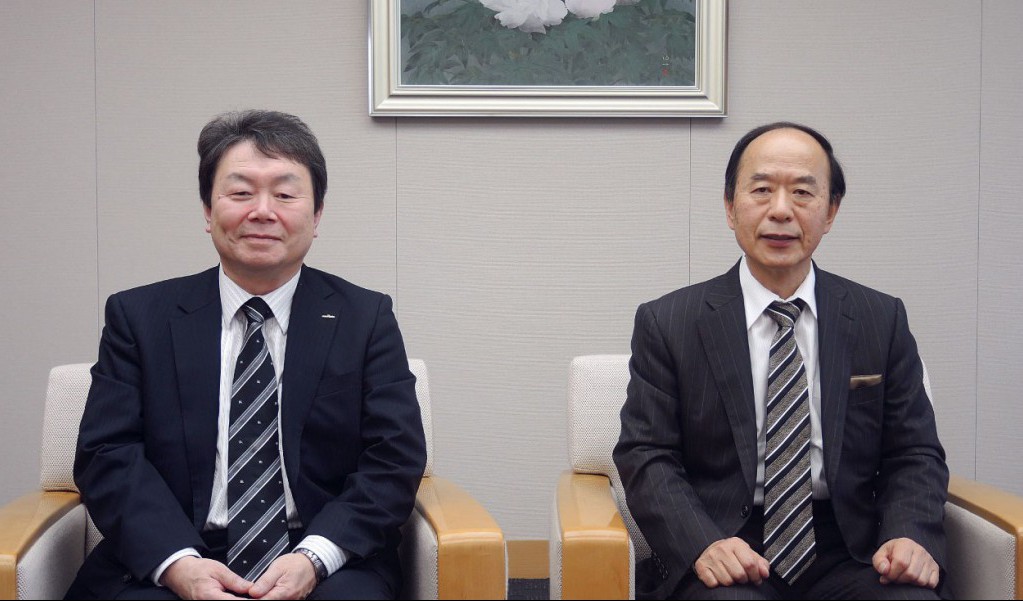This post is also available in: Japanese
The “Asobinin Kinsan” Team for a Free-Minded Search for Technology Seeds
Saito: Not only do we need to engage in short-term development to meet customer needs in 1 or 2 years, but we also have to prepare long-term development for product commercialization in 5 or 10 years. What is your company’s approach?
Sakai: Development designed to trigger innovation usually fails to produce the desired result, unfortunately. Our division has a team called “Asobinin Kinsan.” We used thename “Kinsan” but it could be “Ginsan” or anything else for that matter. It is a team of selected employees—five from a group of 100 employees, for example. Those chosen are released from all of their work assignments. Whatever they have, they give it to other employees. Then, they use their free time to start something new. They can come up with anything and do anything. And it doesn’t affect their work performance evaluation. After giving them some advice, we just wait until they submit a report. We never force them to do anything.
It is impossible to drive fundamental changes while working on regular assignments. Furthermore, speed is so important that we tend to only think of immediate achievements. For this reason, I went so far as to create an assignment-free team. You need a team that spends the whole time playing around if you wish to have an innovative development.
Obinata: That sounds very encouraging to me. At ULVAC, we have come up with eight development themes for the employees to work on. This is a 3-year project, but I feel like we need more. Mr. Saito here and I have been discussing launching something like a future business project and a development team with a 10-year goal. The team would be free to come up with development themes and details with a 10-year vision.
Sakai: That sounds good. The important thing is who to choose. From my experience, I prefer someone who does not blend in to the organization much. Someone who thinks outside the box or wishes to win big money is good (laugh).
Someone who says “I don’t want to do normal stuff” is a good candidate. Managers need to be able to identify these employees. You do not need to supervise them but need to check on them without pressuring them. It would be a disaster if you set them completely free. In any case, no one knows the future, so just wait and see what they do.
Obinata: I will keep that in mind.
A Policy of Not Saying “No” and Fast Responses Expanded the Module Business
Saito: According to the data in a magazine that I read, your smartphone parts have high market shares; 60% for Wi-Fi modules, 35% for multilayer ceramic capacitors, and 40% for SAW filters. Other products also have very high shares. What is the secret?
Sakai: The secret is to get a hold of good materials before competitors. We had a high quality dielectric material called barium titanate (BaTiO3) for multilayer capacitors and lead zirconate titanate (PZT) for piezoelectric materials. We supplied them constantly, stably, and rapidly.
The same secret does not however apply to modules.
Let me explain a little.
The first secret is never say “No” to the customers. This policy met a lot of internal resistance. Not saying “No” may be dangerous—there is a risk of us becoming the customer’s slave. There is a fine line between becoming a slave and not.
Another secret is speed. As I mentioned earlier, modules were not used much in mobile phones.
When smartphones became multifunctional and highly functional, discrete components could no longer meet the requirements. When the customers asked us for a solution, we immediately introduced our modules. We met our customer needs quickly and repeatedly, and this I believe led to the expansion of our module business. In the end, it may have been our speed.
Authorizing Employees to Make Decisions is the Key to Fast Responses
Obinata: How did you get that speed?
Sakai: One of the reasons, I think, is our corporate culture that allows the employees to make decisions. An assistant manager or a team leader, instead of a general manager or manager, occasionally makes important decisions while meeting with the customers.
For example, we sent our best engineer to meet with a major mobile phone manufacturer in Northern Europe. You would think someone higher up like an executive officer or general manager would go, but in our case, an engineer who was not much of an English speaker went.
This made the engineers of the mobile phone company very happy. They respect the capabilities of the person instead of formality. They would say “You flew half way around the world all alone to meet us!? Let’s have a tech talk!”
Regardless of how big a company is or how important the project is, we send people who understand the product inside out. Important decisions are made without the presence of their bosses. This is where the speed comes from. Yet at the same time their bosses never say “I haven’t heard about it. No one reported.” I think we are good at communicating.
Obinata: English skills are definitely good to have, but successful communication with engineers relies on the level of technical knowledge. The engineers actively talk to the person with knowledge because they do not want to waste the opportunity to understand.
Sakai: At Murata, individual employees, irrespective of the organizational hierarchy, fully engage with the customers.
This could be dangerous because important decisions are made without the knowledge of their bosses. But when you think about it, a manager with insufficient technical knowledge cannot make decisions on the spot until he/she talks to someone who understands. This is not efficient.
Obinata: I also believe authorizing employees to make decisions energizes a company. I want to build a corporate culture like yours quickly, but I do not have the guts you do.

